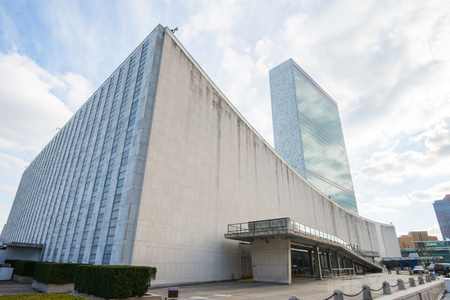NSA reportedly bugged UN offices, hacked into video conferencing feeds
The NSA bugged offices in the UN’s New York headquarters as part of a comprehensive surveillance program, says Der Spiegel. According to files leaked by Edward Snowden, the agency has bugged more than 80 embassies and consulates under a program called the “Special Collection Service.” The program is “intensive and well organized and has little or nothing to do with warding off terrorists.” In New York, that included tapping into video conference calls, which the NSA managed to do in the summer of 2012. “The data traffic gives us internal video teleconferences of the United Nations (yay!),” reads one document, which also says that the number of communications that were decoded rose from 12 to 458 in three weeks.
Der Spiegel also reports that besides the UN’s headquarters, the European Union and International Atomic Energy Agency were bugged — Snowden’s documents allegedly include IT infrastructure and server information from the EU’s New York delegation. Previous documents have already pointed towards a wide-ranging effort to surveil the EU across several countries, prompting European backlash against the US.
It was already suspected that the NSA had routinely bugged UN offices for decades before 2012. In his exposé The Shadow Factory, journalist James Bamford reported that the agency spied heavily on UN officials in the lead-up to the war in Iraq, looking for ways to sway them into supporting the invasion. “From the first day I entered my office they said, ‘Beware, your office is bugged, your residence is bugged, and it is a tradition that the member states who have the technical capacity to bug will do it without any hesitation,'” said former UN Secretary-General Boutros Boutros-Ghali. In 2004, UK member of parliament Claire Short revealed that she had seen transcripts of confidential conversations involving Kofi Annan — who led the UN during the Iraq war — and implicated British spies in the bugging effort. The recent firestorm of anti-NSA and anti-GCHQ sentiment, however, could put more force behind these latest allegations.
NSA reportedly bugged UN offices, hacked into video conferencing feeds
The NSA bugged offices in the UN’s New York headquarters as part of a comprehensive surveillance program, says Der Spiegel. According to files leaked by Edward Snowden, the agency has bugged more than 80 embassies and consulates under a program called the “Special Collection Service.” The program is “intensive and well organized and has little or nothing to do with warding off terrorists.” In New York, that included tapping into video conference calls, which the NSA managed to do in the summer of 2012. “The data traffic gives us internal video teleconferences of the United Nations (yay!),” reads one document, which also says that the number of communications that were decoded rose from 12 to 458 in three weeks.
Der Spiegel also reports that besides the UN’s headquarters, the European Union and International Atomic Energy Agency were bugged — Snowden’s documents allegedly include IT infrastructure and server information from the EU’s New York delegation. Previous documents have already pointed towards a wide-ranging effort to surveil the EU across several countries, prompting European backlash against the US.
It was already suspected that the NSA had routinely bugged UN offices for decades before 2012. In his exposé The Shadow Factory, journalist James Bamford reported that the agency spied heavily on UN officials in the lead-up to the war in Iraq, looking for ways to sway them into supporting the invasion. “From the first day I entered my office they said, ‘Beware, your office is bugged, your residence is bugged, and it is a tradition that the member states who have the technical capacity to bug will do it without any hesitation,'” said former UN Secretary-General Boutros Boutros-Ghali. In 2004, UK member of parliament Claire Short revealed that she had seen transcripts of confidential conversations involving Kofi Annan — who led the UN during the Iraq war — and implicated British spies in the bugging effort. The recent firestorm of anti-NSA and anti-GCHQ sentiment, however, could put more force behind these latest allegations.

